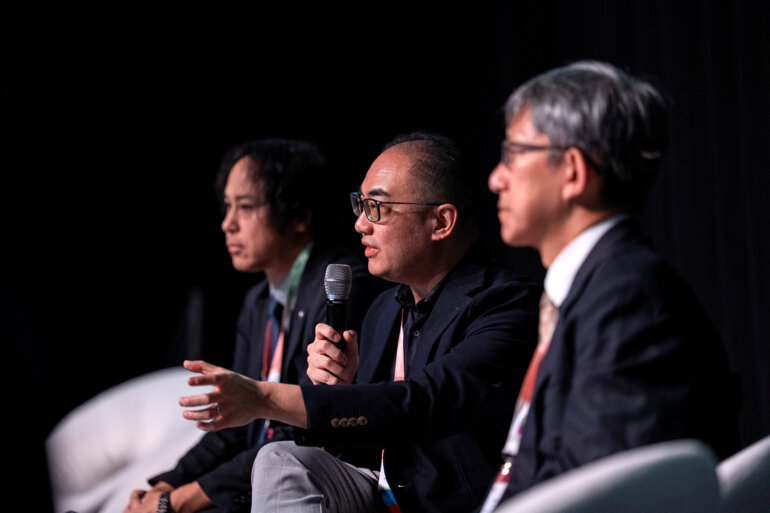Several studies report on promising data with immunomodulation and alternative approaches
Advances in technologies have refined our understanding of the biological processes of cancer leading to the development of sophisticated therapeutic approaches. Immunomodulation is still leading the way, but alternative strategies are also emerging as some studies presented at the ESMO Congress 2024 show (Barcelona, 13-17 September).
The crosstalk between cancer cells and the immune system involves several pathways and cell subtypes to trigger and support an immune response against cancers. Several molecules are able to modulate such a response and are used as targets for therapies. Among those emerging as promising, the E3 ligase Casitas B-lineage lymphoma proto-oncogene B (CBL-B) has been found to be a negative regulator of the immune system, and HST-1011, a selective, oral CBL-B inhibitor, has now been developed. In the first-in-human, multicentre phase I/II SOLAR1 trial in 28 patients with various solid tumours, clinical responses were reported with the use of this agent (Abstract 991O). Similar results were also reported when targeting B7H7, a novel immune checkpoint, with HBM1020, a first-in-class anti-B7H7 antibody designed to augment the T-cell anti-tumour response (Abstract 1010P). In the complex response against cancer, several types of immune cells play a role, including myeloid cells through interleukin-1 receptor accessory protein (IL1RAP), which can be targeted by the antibody-dependent cellular cytotoxicity (ADCC) monoclonal antibody nadunolimab. In a study presented in Barcelona, the agent was tested in combination with pembrolizumab in a few patients with solid tumours, with an acceptable safety profile and some responses at an early stage (Abstract 1012P). Another newly discovered immune checkpoint is IGSF8, which is able to suppress the activity of natural killer (NK) cells. The use of GV20-0251, an antibody against IGSF8, has been tested in an early phase study including heavily pre-treated patients with solid tumours, showing manageable toxicity and anti-tumour activity (Abstract 1000MO). Further, inhibiting diacylglycerol kinase (DGK)ζ has the potential to enhance the activation of T cells, and the DGKζ inhibitor ASP1570 was tested in more than 40 patients in a phase I/II multicentre, open-label study, reporting specific toxicities and some responses (Abstract 1004P).
Despite a deep understanding of the mechanisms underlying the activation of the immune system, not all preclinical results are the same in patients. An example of this is given by two phase I dose-escalation studies presented at the Congress, both investigating STING agonists – dazostinag as a single agent or in combination (Abstract 996MO) and BI 1703880 with or without the anti-PD-1 antibody ezabenlimab (Abstract 1007P) – showing dismal results. These data open new questions on how response and resistance to immunotherapy occur.
Some exciting data are emerging from approaches other than immunomodulation, with the use of, for example, a cancer-antigen specific antibody, IMA401, for patients with HLA-A*02:01 and MAGEA4/8-positive tumours: its use has shown an objective response in 6 of 29 patients, and 5 of 17 with high levels of MAGEA4/8 (Abstract 1001MO).
Finally, impressive results were reported with the use of a combinatorial therapy including chimeric antigen receptor (CAR)-T cells targeting claudin 6 (CLDN6) with a CLDN6-encoding CAR T cell-amplifying RNA vaccine, which increases presentation of the target to T cells for continuous stimulation. The objective response rate of 38% is more than a promising result (Abstract 611O).
Gaining a perception of how science and technology are shaping the treatment scenario for patients with cancer is crucial for all medical oncologists, and these studies provide a glimpse of the targets and application modalities that will drive advances in cancer care in the near future.
Programme details
Sanborn RE, et al. First-in-human (FIH) phase I data of HST-1011, an oral CBL-B inhibitor, in patients with advanced solid tumors. ESMO Congress 2024, Abstract 991O
Proffered Paper Session – Investigational immunotherapy, 13.09.2024, h. 16:00 – 17:30, Burgos Auditorium – Hall 5
Olson O, et al. Phase I/II trial of ASP1570, a novel diacylglycerol kinase ζ inhibitor, in patients with advanced solid tumors. ESMO Congress 2024, Abstract 1004P
Poster Display– Investigational immunotherapy, 14.09.2024, h. 12:00 – 13:00, Hall 6
Harrington KJ, et al. Systemic STING agonist BI 1703880 plus ezabenlimab in patients (pts) with advanced solid tumors: Initial results from a phase Ia study. ESMO Congress 2024, Abstract 1007P
Poster Display– Investigational immunotherapy, 14.09.2024, h. 12:00 – 13:00, Hall 6
Henry J, et al. Phase I dose-escalation study of HBM1020: A novel anti-B7H7 antibody in patients with advanced solid tumors. ESMO Congress 2024, Abstract 1010P
Poster Display– Investigational immunotherapy, 14.09.2024, h. 12:00 – 13:00, Hall 6
Cohen R, et al. Safety, tolerability, and efficacy of nadunolimab in combination with pembrolizumab in patients with solid tumors. ESMO Congress 2024, Abstract 1012P
Poster Display– Investigational immunotherapy, 14.09.2024, h. 12:00 – 13:00, Hall 6
Haanen JB, et al. Updated results from BNT211-01 (NCT04503278), an ongoing, first-in-human, phase I study evaluating safety and efficacy of CLDN6 CAR T cells and a CLDN6-encoding mRNA vaccine in patients with relapsed/refractory CLDN6+ solid tumors. ESMO Congress 2024, Abstract 611O
Proffered Paper Session 2 – Developmental therapeutics, 15.09.2024, h. 14:45 – 16:15, Salamanca Auditorium – Hall 5
Luke JJ, et al. Dazostinag (TAK-676) alone and in combination with pembrolizumab (pembro) in patients (pts) with advanced/metastatic solid tumors: Data from phase I dose escalation. ESMO Congress 2024, Abstract 996MO
Mini Oral Session – Investigational immunotherapy, 16.09.2024, h. 10:15 – 11:45, Granada Auditorium – Hall 6
Wentzel K, et al. A phase I/II, open-label study of the novel checkpoint IGSF8 inhibitor GV20-0251 in patients with advanced solid tumors. ESMO Congress 2024, Abstract 1000MO
Mini Oral Session – Investigational immunotherapy, 16.09.2024, h. 10:15 – 11:45, Granada Auditorium – Hall 6
Wermke M, et al. Initial safety, pharmacokinetics, and anti-tumor activity data of TCER IMA401, a MAGEA4/8-directed half-life extended TCR bispecific, in Phase I dose escalation. ESMO Congress 2024, Abstract 1001MO
Mini Oral Session – Investigational immunotherapy, 16.09.2024, h. 10:15 – 11:45, Granada Auditorium – Hall 6






